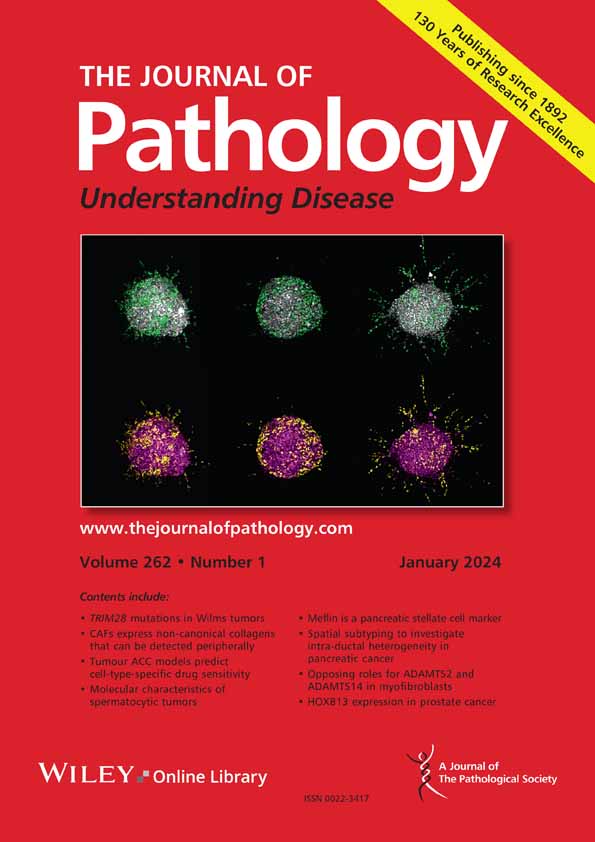Characterization of discordance between mismatch repair deficiency and microsatellite instability testing may prevent inappropriate treatment with immunotherapy
Birgit S Geurts, Laurien J Zeverijn, Jade M van Berge Henegouwen, Hanneke van der Wijngaart, Louisa R Hoes, Gijs F de Wit, Ilse AC Spiekman, Thomas W Battaglia, Daphne M van Beek, Paul Roepman, Anne ML Jansen, Wendy WJ de Leng, Annegien Broeks, Mariette Labots, Carla ML van Herpen, Hans Gelderblom, Henk MW Verheul, Petur Snaebjornsson, Emile E Voest
求助PDF
{"title":"Characterization of discordance between mismatch repair deficiency and microsatellite instability testing may prevent inappropriate treatment with immunotherapy","authors":"Birgit S Geurts, Laurien J Zeverijn, Jade M van Berge Henegouwen, Hanneke van der Wijngaart, Louisa R Hoes, Gijs F de Wit, Ilse AC Spiekman, Thomas W Battaglia, Daphne M van Beek, Paul Roepman, Anne ML Jansen, Wendy WJ de Leng, Annegien Broeks, Mariette Labots, Carla ML van Herpen, Hans Gelderblom, Henk MW Verheul, Petur Snaebjornsson, Emile E Voest","doi":"10.1002/path.6279","DOIUrl":null,"url":null,"abstract":"<p>In the Drug Rediscovery Protocol (DRUP), patients with cancer are treated based on their tumor molecular profile with approved targeted and immunotherapies outside the labeled indication. Importantly, patients undergo a tumor biopsy for whole-genome sequencing (WGS) which allows for a WGS-based evaluation of routine diagnostics. Notably, we observed that not all biopsies of patients with dMMR/MSI-positive tumors as determined by routine diagnostics were classified as microsatellite-unstable by subsequent WGS. Therefore, we aimed to evaluate the discordance rate between routine dMMR/MSI diagnostics and WGS and to further characterize discordant cases. We assessed patients enrolled in DRUP with dMMR/MSI-positive tumors identified by routine diagnostics, who were treated with immune checkpoint blockade (ICB) and for whom WGS data were available. Patient and tumor characteristics, study treatment outcomes, and material from routine care were retrieved from the patient medical records and via Palga (the Dutch Pathology Registry), and were compared with WGS results. Initially, discordance between routine dMMR/MSI diagnostics and WGS was observed in 13 patients (13/121; 11%). The majority of these patients did not benefit from ICB (11/13; 85%). After further characterization, we found that in six patients (5%) discordance was caused by dMMR tumors that did not harbor an MSI molecular phenotype by WGS. In six patients (5%), discordance was false due to the presence of multiple primary tumors (<i>n</i> = 3, 2%) and misdiagnosis of dMMR status by immunohistochemistry (<i>n</i> = 3, 2%). In one patient (1%), the exact underlying cause of discordance could not be identified. Thus, in this group of patients limited to those initially diagnosed with dMMR/MSI tumors by current routine diagnostics, the true assay-based discordance rate between routine dMMR/MSI-positive diagnostics and WGS was 5%. To prevent inappropriate ICB treatment, clinicians and pathologists should be aware of the risk of multiple primary tumors and the limitations of different tests. © 2024 The Pathological Society of Great Britain and Ireland.</p>","PeriodicalId":232,"journal":{"name":"The Journal of Pathology","volume":"263 3","pages":"288-299"},"PeriodicalIF":5.6000,"publicationDate":"2024-05-15","publicationTypes":"Journal Article","fieldsOfStudy":null,"isOpenAccess":false,"openAccessPdf":"","citationCount":"0","resultStr":null,"platform":"Semanticscholar","paperid":null,"PeriodicalName":"The Journal of Pathology","FirstCategoryId":"3","ListUrlMain":"https://onlinelibrary.wiley.com/doi/10.1002/path.6279","RegionNum":2,"RegionCategory":"医学","ArticlePicture":[],"TitleCN":null,"AbstractTextCN":null,"PMCID":null,"EPubDate":"","PubModel":"","JCR":"Q1","JCRName":"ONCOLOGY","Score":null,"Total":0}
引用次数: 0
引用
批量引用
Abstract
In the Drug Rediscovery Protocol (DRUP), patients with cancer are treated based on their tumor molecular profile with approved targeted and immunotherapies outside the labeled indication. Importantly, patients undergo a tumor biopsy for whole-genome sequencing (WGS) which allows for a WGS-based evaluation of routine diagnostics. Notably, we observed that not all biopsies of patients with dMMR/MSI-positive tumors as determined by routine diagnostics were classified as microsatellite-unstable by subsequent WGS. Therefore, we aimed to evaluate the discordance rate between routine dMMR/MSI diagnostics and WGS and to further characterize discordant cases. We assessed patients enrolled in DRUP with dMMR/MSI-positive tumors identified by routine diagnostics, who were treated with immune checkpoint blockade (ICB) and for whom WGS data were available. Patient and tumor characteristics, study treatment outcomes, and material from routine care were retrieved from the patient medical records and via Palga (the Dutch Pathology Registry), and were compared with WGS results. Initially, discordance between routine dMMR/MSI diagnostics and WGS was observed in 13 patients (13/121; 11%). The majority of these patients did not benefit from ICB (11/13; 85%). After further characterization, we found that in six patients (5%) discordance was caused by dMMR tumors that did not harbor an MSI molecular phenotype by WGS. In six patients (5%), discordance was false due to the presence of multiple primary tumors (n = 3, 2%) and misdiagnosis of dMMR status by immunohistochemistry (n = 3, 2%). In one patient (1%), the exact underlying cause of discordance could not be identified. Thus, in this group of patients limited to those initially diagnosed with dMMR/MSI tumors by current routine diagnostics, the true assay-based discordance rate between routine dMMR/MSI-positive diagnostics and WGS was 5%. To prevent inappropriate ICB treatment, clinicians and pathologists should be aware of the risk of multiple primary tumors and the limitations of different tests. © 2024 The Pathological Society of Great Britain and Ireland.


